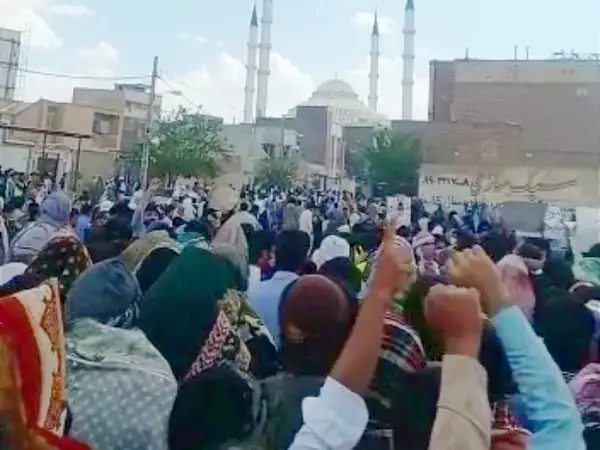March 17 was the last Friday in the Iranian year as people in Zahedan held anti-regime rallies for the 24th week and heard another historic speech by their Sunni leader.
Like in the previous weeks, Mowlavi Abdolahamid delivered a moving Friday sermon, saying that a single ideology cannot and should not be the only dominant view in the country. "One ethnic group and one religion cannot rule the country,” he stated.
Iran is ruled by Shiite Islamic sect ideology and clerics since the 1979 revolution that toppled the monarchy.
Decrying the domination of a single religious view in the country as the cause of Iran's political deadlock, Abdolhamid said that “Iran is a rainbow of ethnicities, religions and pluralities,” suppressed by the ruling religious view for the past 44 years. The Islamic Republic has not been able to establish equality and balance among such a variety of views while ideas have failed the nation.
Implicitly calling for a secular democracy, Abdolhamid said that the Islamic Republic has limited the Iran’s potential with its narrow interpretation of religion in governing the country.
He said that the regime has prevented meritocracy by preventing people of other ideologies from acquiring positions and important roles in the government. He pointed out that Sunni Iranians have no significant role in the judiciary and administration even at local level.
“Our dear Shia friends also complain about such discrimination, saying that that qualified individuals, who are not very committed to religious practices but are capable academics, thinkers and worthy managers have been discriminated against,” he added.
He emphasized that the "rainbow" is the right metaphor for the diversities in Iran, denouncing the dominant religious ideology for not creating equality for other ideas.
"Today, a military and security point of view prevails throughout Iran, but no country whose ruling point of view is security and military will develop," he said. The view of the government should be comprehensive and national, not religious, because the religious view will fail, he noted.
Comparing the current value of the national currency with that of the Pahlavi era before the 1979 Islamic Revolution, he criticized the narrow and religious view of the ruling power of the country that has damaged the principles of Islam in the country.
The Iranian rial has dropped from 70 against the US dollar in 1979 to 470,000 currently.
He condemned "torture, beating, killing and violation of people's rights," saying that the oppression of others is "worse than polytheism and disbelief.”
"The presence of police officers in the streets should be avoided,” he added. “In many countries, when security is high, there is no need for a visible police presence since the people's general trust in the government is strong."
Activists reported a large presence of security forces in the restive city as hundreds of demonstrators took to the streets, chanting "Freedom, Freedom, Freedom," "We don’t want the Islamic Republic" and "Political prisoners must be released."
Zahedan is the provincial capital of Sistan-Baluchestan Province, home to Iran's Sunni Baluch minority of up to two million people.
Residents have been holding protest rallies every Friday since September 30 when security forces killed nearly 90 people, in the deadliest incident so far in the nationwide demonstrations triggered by the September death in custody of a 22-year-old Kurdish woman, Mahsa Amini.
